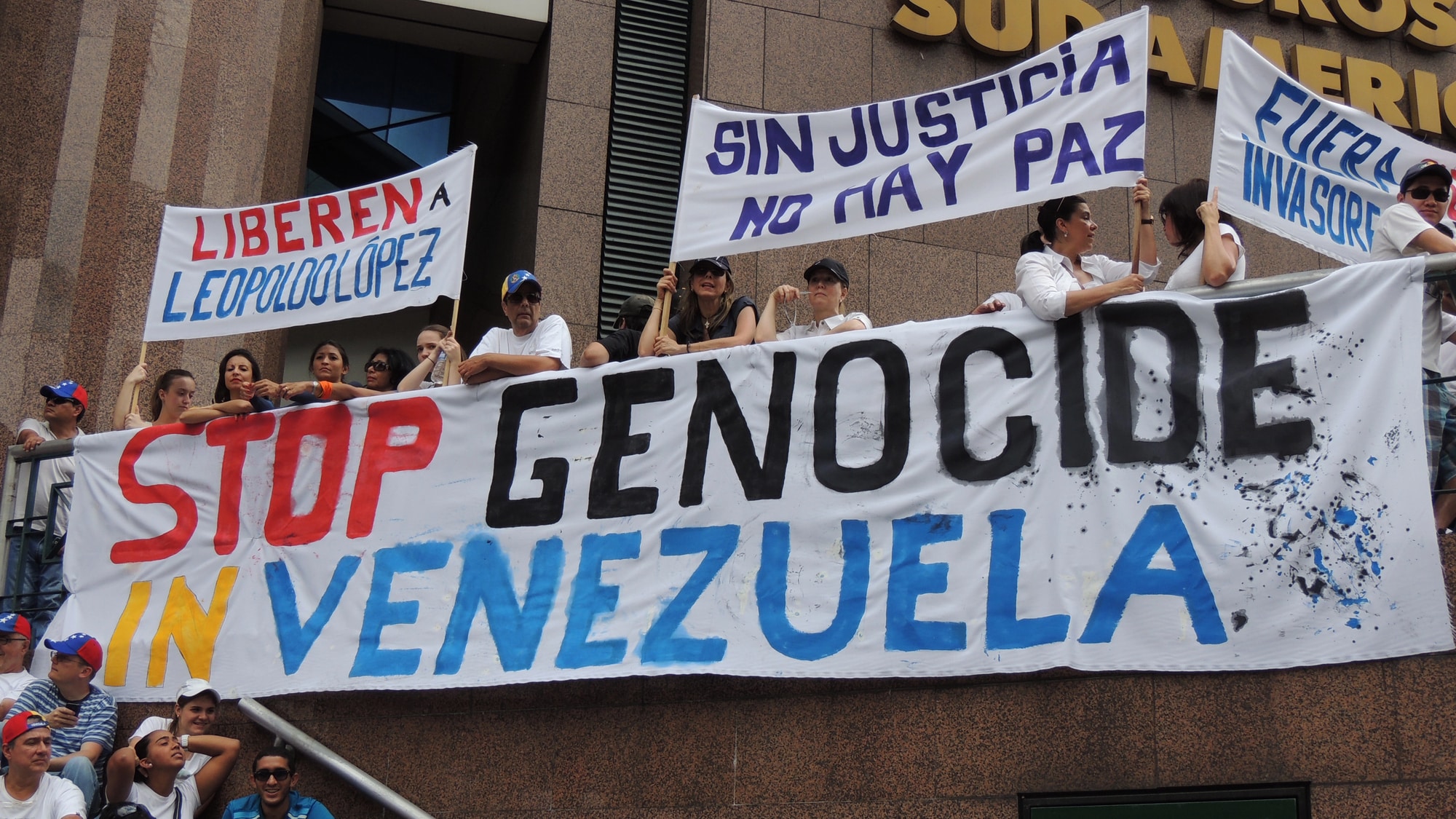On a moonless night in September 2025, American warships patrolling the Caribbean Sea opened fire on a Venezuelan vessel, killing eleven people. Defense Secretary Pete Hegseth described it matter-of-factly as another drug interdiction operation. But to those watching the steady deterioration of U.S.-Venezuela relations over the past three decades, the deadly strike represented something far more ominous: the culmination of nearly thirty years of failed policy, botched coups, and mounting hostility that has brought two nations to the brink of armed conflict.
Today, experts estimate the odds of military conflict at roughly one in three before year’s end. With over 6,500 American troops deployed to the region, F-35 fighter jets prowling Venezuelan airspace, and President Donald Trump declaring the United States in “armed conflict” with drug cartels, the question is no longer whether Washington will escalate further but whether it has learned anything from three decades of counterproductive intervention.
The answer, unfortunately, appears to be no.
The current crisis accelerated after Venezuela’s disputed July 28, 2024 presidential election. While Nicolás Maduro’s government declared victory with 51.2% of the vote, opposition candidate Edmundo González claims to have won with approximately 67%, according to verified tally sheets from thousands of polling centers. The Carter Center declared the election failed to meet international standards and “cannot be considered democratic.”
González subsequently fled to exile in Spain in September 2024, spending thirty-two days hidden in the Dutch embassy before escaping the country on a Spanish military aircraft. Opposition leader María Corina Machado claimed his life was in danger from “growing threats, legal citations, arrest orders, and even blackmail attempts.”
The Trump administration’s response has been unequivocal military pressure. Since September, U.S. forces have conducted at least four deadly strikes against alleged drug vessels, killing fifteen people in total. The administration sent Congress a confidential notice declaring that drug cartels are engaged in an “armed attack” against the United States, asserting war powers without Congressional approval—a sweeping claim that treats counternarcotics as armed conflict.
Venezuela has responded with its own military preparations. Maduro signed a decree granting himself expanded emergency powers in case of U.S. incursion, allowing him to mobilize forces nationwide and grant the military control over public services and the oil industry. Venezuelan forces have conducted amphibious warfare exercises, while Maduro declared Christmas in October and deployed 25,000 troops to the borders—clear signs of a nation preparing for war.
Yet this confrontation didn’t emerge from nowhere. It represents the bitter harvest of nearly three decades of American intervention that has consistently achieved the opposite of its stated goals.
The breakdown began with Hugo Chávez’s election in 1999. While U.S.-Venezuela relations remained stable throughout the 1990s, Chávez’s self-described “socialist” and “anti-imperialist” agenda marked a fundamental shift.
The first major rupture came on April 11, 2002, when military officers briefly overthrew Chávez for forty-seven hours. Business leader Pedro Carmona was installed as president, dissolving the National Assembly and Supreme Court. The George W. Bush administration’s immediate recognition of the coup government devastated America’s credibility, even after officials backtracked when the putsch collapsed.
This established a pattern that would repeat for decades: United States support for regime change through extralegal means, followed by failure and recrimination. The 2002-2003 oil industry strike, which virtually shut down production for two months with tacit American backing, similarly failed to dislodge Chávez while crippling Venezuela’s economy.
Relations deteriorated through a series of diplomatic expulsions that read like a chronicle of mounting hostility. Chávez expelled U.S. Ambassador Patrick Duddy in 2008 after an alleged coup attempt was uncovered. Maduro followed with three diplomat expulsions in 2013, three more in 2014, and another wave of diplomatic expulsions in 2018. The final break came in 2019 when Washington recognized opposition leader Juan Guaidó as interim president, leading to complete withdrawal of US diplomatic personnel.
Perhaps no aspect of U.S. policy better illustrates the futility of intervention than the sanctions regime. Since 2005, Washington has imposed twelve distinct rounds of sanctions, representing one of the most comprehensive economic warfare campaigns in the Western Hemisphere.
The Trump administration’s “maximum pressure” campaign dramatically escalated in 2017-2020, blocking Venezuela from U.S. financial markets and targeting state oil company PDVSA. Sectoral sanctions hit gold, mining, and banking. The result? Venezuela’s oil export revenue collapsed from $4.8 billion in 2018 to just $477 million in 2020.
Yet Maduro remains in power. The Joe Biden administration temporarily lifted some sanctions in October 2023 in exchange for electoral commitments, only to reimpose them in April 2024 when Venezuela failed to comply. The current administration has gone further, implementing “secondary tariffs”—an unprecedented measure targeting any country purchasing Venezuelan oil—and increasing Maduro’s bounty to $50 million.
Currently, the United States maintains 431 designations on Venezuelan individuals and entities, sanctioning eighty-eight individuals and forty-six entities. The humanitarian cost has been catastrophic, yet regime change remains as elusive as ever.
Beyond sanctions, the United States has been involved in or supported at least five major coup attempts and military actions since 2002. The April 2019 “Operation Freedom” saw Guaidó attempt to spark a military uprising with National Guard support, only to fail within hours when commanders remained loyal to Maduro.
Most spectacularly, Operation Gideon in May 2020 saw former U.S. Green Beret Jordan Goudreau lead a mercenary invasion with sixty Venezuelan dissidents and two American ex-Special Forces operators. Venezuelan forces killed six attackers and captured most others, including the two Americans, in what became known as the “Bay of Piglets.”
Now, in 2025, the second Trump administration has deployed eight warships carrying over 4,000 personnel and a nuclear submarine to the Caribbean—the most significant military buildup to date.
Parallel to military and economic pressure, the United States has systematically funded Venezuelan opposition groups through organizations like the National Endowment for Democracy (NED). From $257,800 in 1999, funding exploded to $2.66 million in NED programs by 2019.
The NED trained key opposition figures including Juan Guaidó, who attended insurrection training in Belgrade, Serbia in 2005. These efforts represent classic “color revolution” tactics that consist of manipulating civil society and funding opposition to achieve regime change through the appearance of organic popular movements.
To justify military action, the Trump administration has built a legal framework treating Venezuelan officials as narco-terrorists. In 2020, the United States indicted Maduro on federal narco-terrorism charges, alleging he leads the “Cartel de los Soles” (Cartel of the Suns). The indictment claims Maduro commands a drug trafficking organization that prioritizes “using cocaine as a weapon against America.”
In 2025, the administration designated both the Tren de Aragua gang and Cartel de los Soles as Foreign Terrorist Organizations, providing legal justification for military strikes. Yet experts from the website Caracas Chronicles note the “Cartel de los Soles” is not a traditional cartel but rather a “catch-all term” for various military-political-criminal networks—”a system that the regime regulates” rather than a single organization.
After thirty years of escalating intervention, what has the United States achieved? Maduro remains in power. Venezuela has deepened ties with Russia, China, and Iran. The humanitarian crisis has worsened catastrophically. Multiple coup attempts have only strengthened authoritarian control. Comprehensive sanctions devastated the economy but failed to dislodge the government.
The international community increasingly questions American interventionism. While the United States, United Kingdom, and most Western nations refuse to recognize Maduro’s election victory, Russia and China congratulated him. Latin American leaders like Colombia’s Gustavo Petro have condemned U.S. military strikes as “acts of tyranny.” The United Nations has called for investigations into whether U.S. strikes violate international maritime law.
As the United States edges toward potential military intervention in Venezuela, the historical record offers a stark warning. This is a nation that spent trillions attempting to reshape the Middle East through military force, with disastrous results in Iraq, Afghanistan, Libya, and Syria. Now, overstretched and facing multiple global commitments, Washington contemplates yet another intervention but this time in its own hemisphere.
The case of Venezuela underscores the comprehensive failure of U.S. foreign policy over the past three decades. While pouring resources into nation-building thousands of miles away, America largely ignored its own backyard. When it did engage with Venezuela, it chose hostility over dialogue, sanctions over diplomacy, and coup attempts over negotiation.
The result is a potential quagmire that could make previous interventions look measured by comparison. Military action against Venezuela would likely trigger a protracted conflict, refugee flows dwarfing current levels, further radicalization of Latin American politics against U.S. interests, and deeper involvement by Russia and China in the hemisphere. Venezuela’s geography—mountainous terrain, urban centers, and vast jungle regions—would make any military operation extraordinarily complex.
Nearly thirty years of failed policy demand a fundamental reassessment.
A new approach is desperately needed. Specifically, a foreign policy that prioritizes diplomatic engagement over military threats, multilateral cooperation over unilateral sanctions, and long-term stability over short-term regime change fantasies. This means accepting that the United States cannot simply bomb or sanction its way to a democratic Venezuela.
It means recognizing that regime change attempts have consistently backfired, strengthening the very governments they aimed to topple. It means acknowledging that comprehensive sanctions primarily hurt civilians while giving authoritarian leaders a convenient external enemy to blame for economic failures.
Most fundamentally, it means learning from three decades of failure before embarking on yet another bungled foreign policy expedition. The American people deserve better than to see their military trapped in another unwinnable conflict. The Venezuelan people deserve better than to become collateral damage in another failed intervention.
The current trajectory leads only to more death, more suffering, and more strategic failure. After thirty years of deteriorating relations built on coups, sanctions, and hostility, perhaps it’s time to try something radically different: diplomacy, engagement, and respect for sovereignty.
































